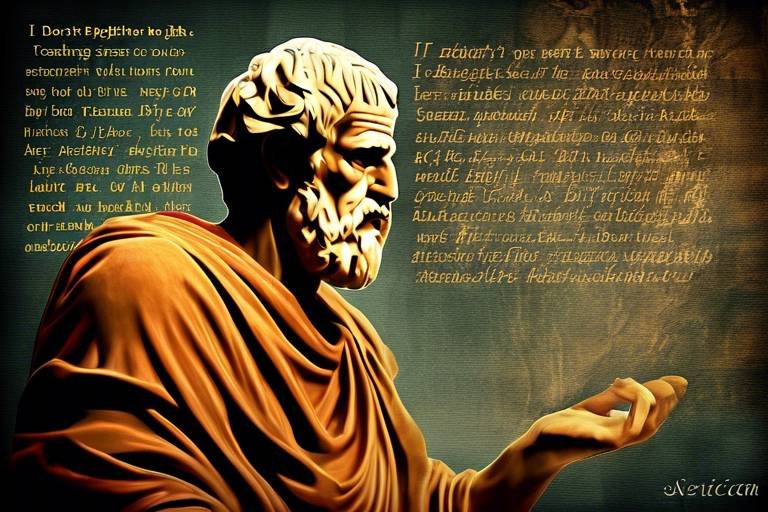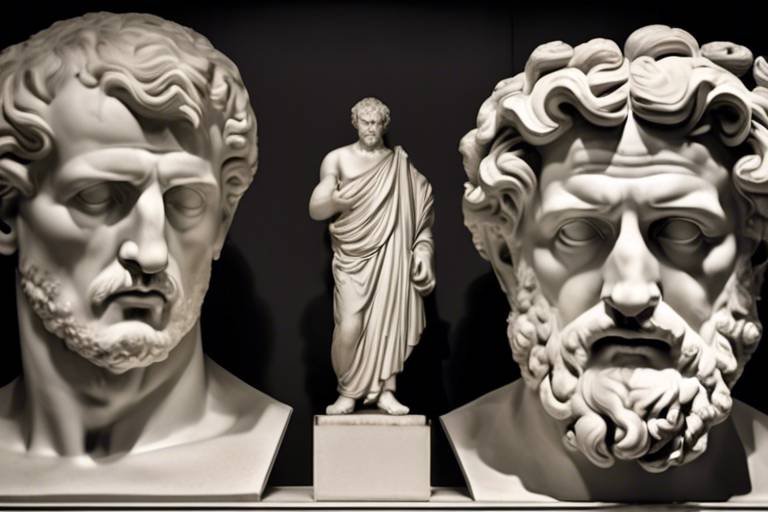Teachings of Stoicism - What Can We Learn from Seneca?
In a world that often feels chaotic and overwhelming, the teachings of Stoicism offer a refreshing perspective on how to navigate life's challenges. At the heart of this ancient philosophy lies the wisdom of Seneca, a Roman statesman, playwright, and philosopher whose insights continue to resonate with us today. So, what can we learn from Seneca? The answer is layered, rich, and deeply applicable to our modern lives. Stoicism teaches us to embrace rationality, self-control, and virtue, guiding us toward a more fulfilling existence. By understanding Seneca's teachings, we can cultivate a mindset that not only helps us endure hardships but also transforms our approach to happiness and fulfillment.
Seneca believed that life is full of uncertainties and adversities, yet it is our perception and response to these challenges that define our character. He famously stated, "We suffer more often in imagination than in reality," reminding us that our fears often stem from our thoughts rather than actual events. This insight is incredibly powerful in today's fast-paced society, where anxiety can easily take hold. By adopting a Stoic mindset, we learn to focus on what we can control—our thoughts, actions, and reactions—while letting go of what we cannot. This shift in perspective is not just liberating; it empowers us to live more authentically and with greater purpose.
Moreover, Seneca's teachings emphasize the importance of virtue as the cornerstone of a good life. He argued that true happiness is not found in external circumstances or material possessions but rather in aligning our actions with our values. This perspective invites us to reflect on our own lives: Are we living in accordance with what we truly believe in? Are we prioritizing our well-being and the well-being of others? By consistently asking ourselves these questions, we can cultivate a life of integrity and fulfillment.
In addition to virtue, Seneca also highlights the role of adversity in personal growth. He believed that challenges are not merely obstacles to be avoided but opportunities for development. When faced with difficulties, we can either succumb to despair or rise to the occasion, using those experiences to strengthen our resolve and character. This idea can be likened to a muscle that grows stronger through resistance; the more we face our fears and challenges, the more resilient we become. Embracing adversity as a teacher allows us to transform our mindset and view setbacks as stepping stones to success.
As we delve deeper into Seneca's teachings, we discover practical applications that can enhance our daily lives. Whether it's through mindfulness practices, emotional resilience, or ethical decision-making, the principles of Stoicism provide us with a toolkit for navigating the complexities of modern life. For instance, by practicing mindfulness, we can ground ourselves in the present moment, reducing anxiety and enhancing our overall sense of well-being. Seneca encourages us to take a step back, breathe, and engage with the world around us, rather than getting lost in the whirlwind of our thoughts.
In conclusion, the teachings of Seneca offer invaluable lessons that can transform our approach to life. By embracing Stoicism, we can cultivate a mindset rooted in rationality, virtue, and resilience. As we learn to navigate adversity with grace and purpose, we discover that true happiness lies not in external circumstances but in our inner strength and integrity. So, what can we learn from Seneca? The answer is simple yet profound: we can learn to live with intention, embrace challenges, and find peace within ourselves.
1. What is Stoicism?
Stoicism is an ancient Greek philosophy that teaches the development of self-control and fortitude as a means to overcome destructive emotions. It emphasizes rationality and virtue as pathways to a fulfilling life.
2. Who was Seneca?
Seneca was a Roman philosopher, statesman, and playwright who lived during the first century AD. He is known for his writings on Stoicism and his insights into the human condition.
3. How can I apply Stoic principles in my daily life?
You can apply Stoic principles by practicing mindfulness, focusing on what you can control, and reflecting on your values to ensure your actions align with them.
4. What is the significance of adversity in Stoicism?
Adversity is seen as an opportunity for growth in Stoicism. It teaches resilience and helps individuals develop a deeper understanding of themselves and their capabilities.
5. How does Seneca's philosophy influence modern self-help practices?
Seneca's emphasis on rationality, virtue, and emotional resilience continues to influence modern self-help movements, encouraging individuals to cultivate a mindset that fosters personal growth and well-being.

Understanding Stoicism
Stoicism is more than just a philosophy; it's a way of life that has stood the test of time, dating back to ancient Greece and Rome. At its core, Stoicism teaches us to embrace rationality, cultivate self-control, and strive for virtue. These principles serve as a roadmap to achieving a fulfilling and meaningful existence. Imagine navigating through life's storms with a sturdy ship—this is what Stoicism offers us: a sturdy vessel to weather the tempests of our emotions and circumstances.
The origins of Stoicism can be traced back to Zeno of Citium, who founded the school around 300 BCE. Zeno’s teachings were later expanded upon by notable philosophers such as Seneca, Epictetus, and Marcus Aurelius. Each contributed unique insights that have enriched the Stoic tradition, but they all shared a common belief: that we can achieve tranquility and happiness by focusing on what we can control and accepting what we cannot.
One of the fundamental principles of Stoicism is the dichotomy of control. This concept encourages us to distinguish between what is within our power—our thoughts, intentions, and actions—and what lies beyond our control—external events, the actions of others, and even our past choices. By concentrating on the former and letting go of the latter, we can reduce anxiety and cultivate a sense of peace. It’s like trying to control the weather; it’s futile! Instead, why not prepare for the rain?
Another essential aspect of Stoicism is the emphasis on virtue as the highest good. Stoics believe that living virtuously—exhibiting qualities like wisdom, courage, justice, and temperance—leads to genuine happiness. In a world filled with distractions and temptations, this teaching serves as a guiding light, reminding us to align our actions with our values. It’s like having a compass that always points true north, helping us navigate the complexities of life.
Moreover, Stoicism teaches us to practice mindfulness and presence. Seneca famously stated, “We suffer more often in imagination than in reality.” This highlights the importance of living in the moment and not getting lost in worries about the future or regrets about the past. By anchoring ourselves in the present, we can appreciate life’s beauty and experience joy more fully. Think of it as a beautiful sunset; if you're too busy checking your phone, you might miss the stunning colors painting the sky.
In summary, understanding Stoicism is about recognizing its profound teachings that encourage rational thought, self-discipline, and virtuous living. As we delve deeper into Seneca’s insights, we will uncover how these ancient principles can be applied to modern life, helping us cultivate resilience and navigate the challenges we face every day.

Seneca's Life and Influence
Lucius Annaeus Seneca, commonly known as Seneca the Younger, was born around 4 BC in Corduba (modern-day Córdoba, Spain) and became one of the most prominent figures in Stoic philosophy. His life was a tapestry of contrasts, woven with threads of political intrigue, personal tragedy, and philosophical reflection. As a statesman, playwright, and philosopher, Seneca's contributions to Stoicism are profound and enduring. He served as an advisor to Emperor Nero, a position that placed him at the heart of power but also embroiled him in the complexities of court politics. Despite his high status, Seneca faced exile and personal loss, which deeply influenced his philosophical outlook and writings.
Seneca's literary works, including essays, letters, and tragedies, are rich with Stoic principles. His collection of letters, known as the “Letters to Lucilius,” serves as a practical guide to applying Stoic philosophy in everyday life. Through these letters, Seneca addresses themes such as the fleeting nature of life, the importance of virtue, and the necessity of facing adversity with courage. His ability to blend personal anecdotes with philosophical insights makes his writings relatable and impactful, allowing readers to find solace and wisdom in his words.
Moreover, Seneca's experiences shaped his teachings on resilience and moral integrity. He believed that true strength lies not in avoiding challenges but in confronting them head-on. This perspective is particularly relevant in today's fast-paced world, where individuals often feel overwhelmed by external pressures. Seneca's life serves as a testament to the power of Stoicism in navigating life's uncertainties and maintaining a sense of purpose.
Seneca's influence extends beyond his lifetime, resonating with thinkers and leaders throughout history. His thoughts on ethics, virtue, and the human condition have inspired countless individuals seeking to live a meaningful life. In modern times, his teachings continue to be relevant, finding their way into self-help literature and personal development practices. The essence of Seneca's philosophy encourages us to cultivate a mindset of resilience, reminding us that while we cannot control external events, we can control our responses to them.
In summary, Seneca's life and influence exemplify the core tenets of Stoicism. His writings not only reflect his personal journey but also offer timeless wisdom that can guide us in our pursuit of a fulfilling and virtuous life. By embracing his teachings, we can learn to navigate the complexities of existence with grace and fortitude.
- Who was Seneca? Seneca was a Roman philosopher, statesman, and playwright known for his contributions to Stoic philosophy.
- What are Seneca's main teachings? His teachings focus on virtue, resilience, the acceptance of adversity, and the importance of living in the present moment.
- How can I apply Seneca's teachings in my life? You can apply his teachings by practicing mindfulness, managing your emotions, and embracing challenges as opportunities for growth.
- What is the significance of "Letters to Lucilius"? This collection of letters provides practical advice on applying Stoicism to everyday life and reflects Seneca's philosophical insights.

Key Teachings of Seneca
Seneca, one of the most prominent Stoic philosophers, offers a treasure trove of wisdom that can transform our understanding of life and its challenges. His teachings center around several key themes that resonate deeply with anyone seeking to navigate the complexities of modern existence. One of his most significant ideas is the concept of virtue as the highest good. For Seneca, living a virtuous life is essential to achieving true happiness. He believed that virtue is not just about moral integrity, but also about aligning one's actions with reason and wisdom. This alignment leads to a state of tranquility that is unaffected by external circumstances.
Another cornerstone of Seneca's philosophy is the nature of happiness. Unlike the fleeting pleasures that society often promotes, Seneca teaches that genuine happiness stems from within. It is cultivated through self-reflection, ethical living, and the pursuit of knowledge. He famously stated, "A good character, when established, is the greatest asset." This suggests that by focusing on our moral fiber, we can create a stable foundation for happiness that remains intact regardless of life's ups and downs.
Seneca also emphasizes the importance of facing adversity head-on. He viewed challenges not as mere obstacles but as opportunities for growth. In his letters, he often reflects on how adversity can sharpen our resilience and deepen our understanding of ourselves. By embracing difficulties, we can cultivate a mindset that sees problems as essential parts of the journey rather than hindrances. This perspective encourages us to develop a robust emotional framework that allows us to thrive under pressure.
In addition to these themes, Seneca's teachings encourage us to practice mindfulness and presence. He believed that many of our anxieties stem from dwelling on the past or worrying about the future. By grounding ourselves in the present moment, we can experience life more fully and appreciate the beauty that surrounds us. This practice not only enhances our overall well-being but also aligns with the Stoic principle of focusing on what we can control.
Moreover, Seneca's insights into emotional resilience are particularly relevant today. He teaches us that while we cannot control external events, we can control our reactions to them. By accepting what we cannot change and focusing on our responses, we can cultivate a sense of inner peace. This approach helps us navigate life's challenges with grace and fortitude, allowing us to emerge stronger from adversity.
To summarize, Seneca's teachings provide a roadmap for living a meaningful life. By embracing virtue, seeking true happiness, facing adversity, practicing mindfulness, and developing emotional resilience, we can cultivate a sense of purpose and fulfillment. His wisdom is not just for the philosophers of the past; it is a guiding light for anyone looking to enhance their daily lives and thrive in a chaotic world.

The Role of Adversity
Adversity is often seen as a daunting force, something we instinctively shy away from. However, Seneca offers a radically different perspective. He believed that adversity is not just an obstacle but a vital component of personal growth. Imagine life as a sculptor chiseling away at a block of marble; the rough edges represent our struggles, and through these challenges, we are shaped into something beautiful and resilient. Adversity can be the very forge that tempers our character and sharpens our resolve.
Seneca famously stated, “Difficulties strengthen the mind, as labor does the body.” This notion emphasizes that when we face challenges, we are not merely enduring hardship; we are engaging in a transformative process that cultivates our inner strength. Think of it like a workout for the soul. Just as lifting weights builds muscle, navigating through tough times builds emotional resilience. When we confront our fears and hardships, we emerge not only stronger but also more self-aware.
Moreover, Seneca taught that embracing adversity can lead us to a deeper understanding of ourselves and our values. It serves as a mirror, reflecting our true character and revealing what we are made of. In moments of struggle, we often discover our core beliefs and priorities. This self-discovery can be incredibly empowering, as it allows us to align our actions with our values, leading to a more authentic and fulfilling life.
To illustrate Seneca's insights on adversity, consider the following points:
- Growth Mindset: Viewing challenges as opportunities for growth rather than insurmountable problems.
- Resilience Building: Developing coping strategies that enable us to bounce back stronger after setbacks.
- Perspective Shift: Learning to see adversity as a natural part of life, which can foster gratitude for the good times.
In essence, Seneca encourages us to reframe our relationship with adversity. Instead of fearing it, we should welcome it as a teacher. Each challenge we face is an invitation to learn, adapt, and evolve. By shifting our mindset, we can transform our struggles into stepping stones toward a more resilient self. So, the next time life throws a curveball, remember Seneca's wisdom: embrace it, learn from it, and let it shape you into the best version of yourself.
- What is the main lesson from Seneca about adversity? Seneca teaches that adversity is essential for personal growth and resilience. It helps us discover our true character.
- How can I apply Seneca's teachings on adversity in my life? By reframing your mindset to view challenges as opportunities for growth, and by actively seeking to learn from difficult experiences.
- What does Seneca mean by emotional resilience? Emotional resilience refers to the ability to adapt to stress and adversity, maintaining a positive outlook despite challenges.

Practical Applications of Stoicism
Stoicism isn't just an ancient philosophy; it's a practical toolkit for navigating the complexities of modern life. Imagine having a mental armor that protects you from the chaos of daily challenges. That's what the teachings of Seneca and other Stoics offer us. They provide actionable strategies that can help us cultivate a sense of peace, purpose, and resilience. But how exactly can we incorporate these timeless principles into our everyday routines? Let's dive into some practical applications that can transform your life.
First and foremost, embracing mindfulness is crucial. Seneca often emphasized the importance of living in the present moment. In today's fast-paced world, it's easy to get lost in worries about the future or regrets about the past. By practicing mindfulness, we can center ourselves and focus on what truly matters. This could mean taking a few minutes each day to meditate, breathe deeply, or simply be aware of our surroundings. The goal is to cultivate an awareness that allows us to appreciate the here and now, reducing anxiety and enhancing our overall well-being.
Another practical application of Stoicism is the development of emotional resilience. Life is full of ups and downs, and how we respond to these fluctuations can make all the difference. Seneca teaches us that while we cannot control external events, we can control our reactions. This idea can be incredibly empowering. For instance, when faced with a setback, instead of succumbing to frustration, we can pause, reflect, and choose a constructive response. This approach not only helps us manage our emotions but also fosters a greater sense of control over our lives.
Additionally, adopting a virtue-driven mindset can guide our decision-making process. Seneca believed that living virtuously is essential for true happiness. This means aligning our actions with our values and principles. When faced with choices, we can ask ourselves: "Does this action reflect my core values?" or "Will this decision contribute to my personal growth?" By prioritizing virtue over fleeting pleasures, we cultivate a sense of integrity and fulfillment that lasts far longer than any temporary gratification.
Moreover, embracing adversity as a teacher can be transformative. Seneca's insights remind us that challenges are not merely obstacles; they are opportunities for growth. When we encounter difficulties, instead of shying away, we can ask ourselves what lessons can be learned from the experience. This shift in perspective allows us to view struggles as necessary components of our journey, fostering resilience and a deeper understanding of ourselves.
Lastly, engaging in regular self-reflection is a powerful Stoic practice. Taking time to evaluate our thoughts, actions, and feelings can lead to greater self-awareness and personal growth. This could involve journaling about our experiences, contemplating our responses to various situations, or even discussing our thoughts with a trusted friend. By reflecting on our lives, we can identify patterns, recognize areas for improvement, and celebrate our progress, ultimately leading to a more fulfilling life.
Incorporating these Stoic principles into our daily lives doesn't require a complete overhaul of our routines. Instead, it's about making small, intentional changes that align with the teachings of Seneca. Whether it's practicing mindfulness, developing emotional resilience, prioritizing virtue, embracing adversity, or engaging in self-reflection, these applications can help us navigate life's challenges with grace and strength.
- What is the main idea of Stoicism? Stoicism teaches the importance of rationality, self-control, and virtue as pathways to a fulfilling life.
- How can I practice mindfulness? You can practice mindfulness through meditation, deep breathing exercises, or simply by being present in your daily activities.
- What is emotional resilience? Emotional resilience is the ability to adapt to stress and adversity while maintaining a positive outlook.
- How can I develop a virtue-driven mindset? Align your actions with your core values and principles, and make decisions that reflect those values.

Mindfulness and Presence
In our fast-paced world, the concept of mindfulness often feels like a distant dream. We are constantly bombarded with distractions, notifications, and the relentless rush of daily life. However, Seneca, the ancient Stoic philosopher, reminds us of the profound importance of being present. He teaches us that true fulfillment can only be found in the here and now. By embracing mindfulness, we can cultivate a deeper appreciation for our experiences, relationships, and even our own thoughts.
Seneca believed that many of our anxieties stem from dwelling on the past or worrying about the future. He famously stated, "We suffer more often in imagination than in reality." This insight encourages us to reflect on how much of our mental energy is wasted on things that are beyond our control. Instead of spiraling into thoughts of what could have been or what might happen, Seneca urges us to ground ourselves in the present moment. This practice not only alleviates stress but also enhances our ability to respond to life's challenges with clarity and composure.
To put Seneca's teachings into practice, consider incorporating mindfulness exercises into your daily routine. Here are a few practical tips:
- Start with Breathing: Take a few moments each day to focus solely on your breath. Inhale deeply, hold for a moment, and exhale slowly. This simple act can center your thoughts and bring you back to the present.
- Engage Your Senses: Whether you're eating a meal or taking a walk, pay attention to the sensations around you. Notice the flavors, smells, and sounds. Engaging your senses anchors you in the moment.
- Limit Multitasking: Try to focus on one task at a time. By giving your full attention to a single activity, you can enhance your productivity and enjoyment.
These practices are not just about reducing anxiety; they are about enriching our lives. When we are fully present, we can appreciate the little things that often go unnoticed. Imagine savoring a cup of coffee, feeling the warmth of the sun on your skin, or enjoying a conversation without distractions. This level of awareness can transform mundane moments into profound experiences.
Moreover, mindfulness fosters a sense of gratitude. When we are present, we become more aware of the blessings in our lives, no matter how small. Seneca's teachings encourage us to reflect on what we have rather than what we lack. This shift in perspective can lead to a more content and fulfilling life.
Incorporating mindfulness into our lives is a journey, not a destination. It takes practice and patience, but the rewards are well worth the effort. By embracing Seneca's wisdom, we can learn to navigate the complexities of life with grace and resilience. Remember, the present moment is all we truly have, and by cultivating mindfulness, we unlock a deeper connection to ourselves and the world around us.
Q: What is mindfulness?
A: Mindfulness is the practice of being fully present and engaged in the moment, without judgment. It involves focusing on your thoughts, feelings, and surroundings.
Q: How can I practice mindfulness daily?
A: You can practice mindfulness through various techniques such as meditation, deep breathing, and engaging your senses in everyday activities.
Q: What are the benefits of mindfulness?
A: Benefits include reduced stress and anxiety, improved focus, enhanced emotional resilience, and a greater appreciation for life.

Emotional Resilience
Emotional resilience is like a muscle; the more you exercise it, the stronger it becomes. Seneca, the great Stoic philosopher, understood this concept deeply. He taught that our ability to manage emotions, especially during challenging times, is fundamental to living a fulfilling life. Rather than being tossed around by the waves of our feelings, Seneca encourages us to navigate through them with purpose and strength. This emotional fortitude allows us to face life’s inevitable ups and downs without losing our sense of self or purpose.
One of the key insights from Seneca is the importance of acceptance. He believed that while we cannot control external events, we can control our reactions to them. This idea is encapsulated in his famous quote: “We suffer more often in imagination than in reality.” This highlights how our emotional turmoil often stems from our thoughts about situations rather than the situations themselves. By accepting what we cannot change, we free ourselves from unnecessary suffering and can focus on what truly matters—our responses.
Moreover, Seneca emphasizes the value of reflection. Taking time to reflect on our emotions and experiences can provide clarity and understanding. When we pause to examine our feelings, we can better understand their origins and how they affect our behavior. This self-awareness is crucial in developing emotional resilience. Just like a sailor learns to read the winds and tides, we too can learn to navigate our emotional landscapes with greater ease.
To cultivate emotional resilience, Seneca suggests several practical approaches that we can incorporate into our daily lives:
- Practice mindfulness: Being present in the moment helps reduce anxiety and allows us to respond to situations more thoughtfully.
- Reframe challenges: Instead of viewing obstacles as insurmountable, see them as opportunities for growth and learning.
- Embrace discomfort: Understand that discomfort is a natural part of life. By facing our fears and uncertainties, we build resilience.
In addition, Seneca's writings often touch on the concept of community. Surrounding ourselves with supportive individuals can significantly bolster our emotional resilience. Just as a ship is safer in a harbor with other ships, we too can find strength in our connections with others. Sharing our struggles and triumphs with friends and family not only lightens the emotional load but also fosters a sense of belonging and support.
Ultimately, emotional resilience is about finding balance. It’s about recognizing that while we cannot always control what happens to us, we can control how we respond. Seneca’s teachings remind us that by cultivating acceptance, practicing reflection, and leaning on our communities, we can develop a robust emotional foundation. This foundation not only helps us weather life’s storms but also empowers us to thrive amidst adversity.
- What is emotional resilience? Emotional resilience is the ability to adapt to stressful situations and bounce back from adversity.
- How can I develop emotional resilience? You can develop emotional resilience by practicing mindfulness, reframing challenges, and seeking support from your community.
- Why is acceptance important in emotional resilience? Acceptance allows you to focus on your reactions rather than the uncontrollable aspects of a situation, reducing unnecessary suffering.

The Legacy of Seneca's Teachings
Seneca's teachings have transcended time and continue to resonate deeply with individuals seeking guidance in a chaotic world. His insights into the human condition, the nature of happiness, and the importance of virtue have laid a foundation that modern thinkers and philosophers still build upon today. Why do his teachings remain so relevant? Perhaps it’s because they address universal truths about life that are just as applicable now as they were in ancient Rome.
One of the remarkable aspects of Seneca’s philosophy is its adaptability. In an era dominated by rapid technological advancements and constant distractions, his emphasis on mindfulness and self-control serves as a beacon for those yearning for clarity and purpose. For instance, his letters to Lucilius, which are filled with practical advice, have inspired countless readers to reflect on their own lives and choices. This collection of writings not only provides wisdom but also encourages a dialogue between the past and present, urging us to examine our values and priorities.
Seneca's influence can be seen in various fields, including psychology, leadership, and personal development. Many modern self-help movements draw from his teachings, promoting the idea that we can cultivate emotional resilience and find peace amidst adversity. The principles of Stoicism, particularly those articulated by Seneca, advocate for a life of virtue, which has become a guiding philosophy for many contemporary leaders and thinkers.
To illustrate the enduring impact of Seneca’s philosophy, consider the following table showcasing some key areas where his teachings have made a mark:
| Field | Influence |
|---|---|
| Psychology | Development of cognitive-behavioral therapy (CBT) principles that focus on changing negative thought patterns. |
| Leadership | Encouragement of ethical decision-making and resilience in the face of challenges. |
| Personal Development | Promotion of mindfulness practices and emotional intelligence as tools for self-improvement. |
Moreover, Seneca’s teachings have found a home in various self-help literature, where his ideas are often cited to illustrate the importance of facing life’s challenges with courage. His belief that adversity can be a catalyst for personal growth resonates with those who find themselves struggling in today’s fast-paced society. By embracing difficulties, we not only learn more about ourselves but also cultivate a sense of resilience that empowers us to navigate life’s ups and downs.
In conclusion, the legacy of Seneca's teachings is a rich tapestry woven with threads of wisdom applicable to our daily lives. His emphasis on virtue, emotional resilience, and mindfulness continues to inspire individuals from all walks of life. As we reflect on his insights, we are reminded that the journey towards a fulfilling life is not merely about avoiding hardships but rather about embracing them as opportunities for growth. Isn’t that a powerful perspective?
- What is Stoicism? Stoicism is an ancient Greek philosophy that teaches the development of self-control and fortitude as a means to overcome destructive emotions.
- How did Seneca influence modern philosophy? Seneca's writings on ethics, virtue, and the human experience have significantly influenced modern thought, particularly in psychology and self-help.
- Can Stoic principles be applied in daily life? Yes, Stoic principles such as mindfulness, emotional resilience, and ethical decision-making can be practiced daily to enhance well-being and personal growth.
Frequently Asked Questions
- What is Stoicism?
Stoicism is an ancient philosophy that originated in Greece. It teaches the development of self-control, rationality, and virtue as a means to achieve a fulfilling life. By focusing on what we can control and accepting what we cannot, Stoicism encourages a balanced approach to life’s challenges.
- Who was Seneca?
Seneca was a Roman philosopher, statesman, and playwright who lived from 4 BC to AD 65. He is one of the most prominent Stoic thinkers, known for his writings on ethics, resilience, and the human condition. His life experiences, including political turmoil and personal loss, deeply influenced his teachings.
- What are some key teachings of Seneca?
Seneca emphasized the importance of virtue, the pursuit of happiness through inner peace, and the necessity of facing adversity with courage. He believed that true happiness comes from living in accordance with nature and that challenges can lead to personal growth and wisdom.
- How can I apply Stoicism in my daily life?
You can apply Stoicism by practicing mindfulness, focusing on the present moment, and developing emotional resilience. Start by acknowledging your feelings, but also remind yourself to control your reactions. Create a daily routine that includes reflection and gratitude to cultivate a Stoic mindset.
- What role does adversity play in Stoicism?
Adversity is seen as an essential part of life in Stoicism. Seneca taught that facing challenges can strengthen our character and foster resilience. Instead of avoiding difficulties, embracing them can lead to personal growth and a deeper understanding of ourselves.
- How does Seneca define happiness?
For Seneca, happiness is not found in external possessions or achievements but in cultivating a virtuous life. He believed that true happiness arises from within and is achieved by living in accordance with reason and virtue, regardless of external circumstances.
- Can Stoicism help with emotional resilience?
Absolutely! Stoicism teaches us to manage our emotions by accepting what we cannot control and focusing on our responses. This approach helps build emotional resilience, allowing us to navigate life's ups and downs with a clearer mind and a stronger heart.
- Why is mindfulness important in Stoicism?
Mindfulness is crucial in Stoicism as it encourages living in the present moment, reducing anxiety about the future or regrets about the past. By practicing mindfulness, we can better appreciate life’s moments and respond thoughtfully to challenges, aligning with Stoic principles.
- How does Seneca's legacy continue today?
Seneca's teachings resonate in modern self-help movements and personal development practices. His insights on resilience, virtue, and emotional management provide valuable guidance for individuals seeking to improve their lives and navigate the complexities of the modern world.



















